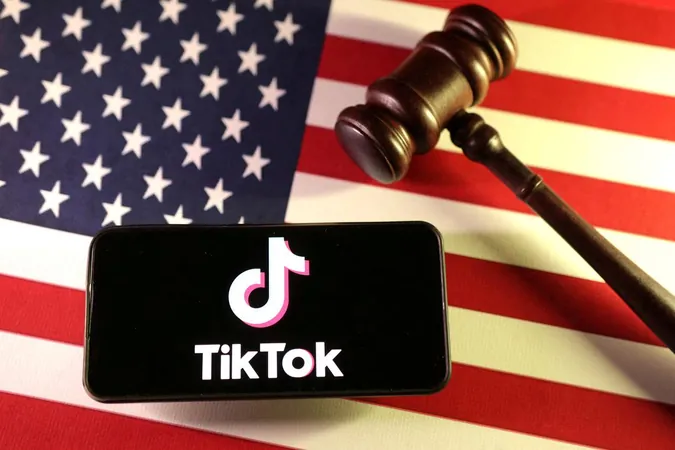
US Supreme Court Upholds Law to Ban TikTok: A Mark in the Ongoing East-West Tensions!
2025-01-17
Author: Li
US Supreme Court Upholds Law to Ban TikTok
In a pivotal decision on January 17, 2025, the US Supreme Court upheld a contentious federal law that mandates the sale of TikTok by its Chinese parent company, ByteDance, or face a ban in the United States by January 19. This ruling emerged from a highly charged atmosphere of national security apprehensions amidst the ever-evolving landscape of social media.
The law, supported overwhelmingly by bipartisan congressional members—including Democratic President Joe Biden—was deemed non-violative of the First Amendment, which protects free speech. The Supreme Court's swift action in this case came only nine days after oral arguments were presented on January 10, emphasizing the urgency of the matter that balances individual rights against potential threats to national security.
Implications of a TikTok Shutdown
With around 270 million American users—many of whom are young—a TikTok shutdown would have significant implications for not just the users but also advertisers and content creators who thrive on the platform. Concerns traced back to China's ownership of TikTok have fueled fears that sensitive user data could be exploited for espionage and manipulation by the Chinese government, particularly amid the ongoing trade tensions between the world powers.
Government's Stance and Legal Arguments
Justice Department attorney Elizabeth Prelogar illustrated the stakes during the proceedings, asserting that TikTok's ties to the Chinese government pose a “grave threat” to the safety of American citizens. The app’s capacity to harvest vast amounts of data on its users for potential nefarious purposes has added weight to the administration’s argument for the ban.
Background of the Law and Legal Battle
The law was cemented in April 2024. Following a defeat at the US Court of Appeals for the District of Columbia Circuit in December 2024, TikTok and ByteDance escalated the battle to the Supreme Court, asserting that their First Amendment rights—as well as those of their users—were being infringed. Their legal counsel argued that the law effectively signals a war on free speech by casting a shadow of suspicion and control over one of America’s most popular social media platforms.
Political Dynamics and Future Prospects
Interestingly, this Supreme Court decision comes on the heels of significant political shifts. Former President Donald Trump, who originally sought to ban TikTok during his administration, recently expressed a shift in perspective, claiming a sentimental connection to the platform for aiding his outreach to younger voters during the 2024 elections. He has indicated a desire for a political resolution rather than outright prohibition as he prepares to take office again on January 20. Notably, Senate Democratic leader Chuck Schumer has suggested that TikTok should be granted further time to seek an American buyer, paving the way for a potential compromise.
Conclusion and Final Deadline
As the clock ticks down to the deadline, TikTok’s leadership, including CEO Chew Shou Zi, remains hopeful; the looming possibility of a viable deal could see the platform survive. However, if no resolution is reached, TikTok plans to pull the plug on its operations in the U.S. on January 19, a move that would alter the digital landscape for millions of Americans.
This legal battle not only serve as a moment for TikTok but also points to the larger narrative of East-West relations where technology, data privacy, and user rights collide in a digital age fraught with geopolitical tension. The outcome of this situation will be closely monitored as it could set a precedent not just for social media platforms but for how nations engage in the delicate dance of diplomacy in the digital era. Stay tuned for more updates as this dramatic saga unfolds!



 Brasil (PT)
Brasil (PT)
 Canada (EN)
Canada (EN)
 Chile (ES)
Chile (ES)
 Česko (CS)
Česko (CS)
 대한민국 (KO)
대한민국 (KO)
 España (ES)
España (ES)
 France (FR)
France (FR)
 Hong Kong (EN)
Hong Kong (EN)
 Italia (IT)
Italia (IT)
 日本 (JA)
日本 (JA)
 Magyarország (HU)
Magyarország (HU)
 Norge (NO)
Norge (NO)
 Polska (PL)
Polska (PL)
 Schweiz (DE)
Schweiz (DE)
 Singapore (EN)
Singapore (EN)
 Sverige (SV)
Sverige (SV)
 Suomi (FI)
Suomi (FI)
 Türkiye (TR)
Türkiye (TR)
 الإمارات العربية المتحدة (AR)
الإمارات العربية المتحدة (AR)